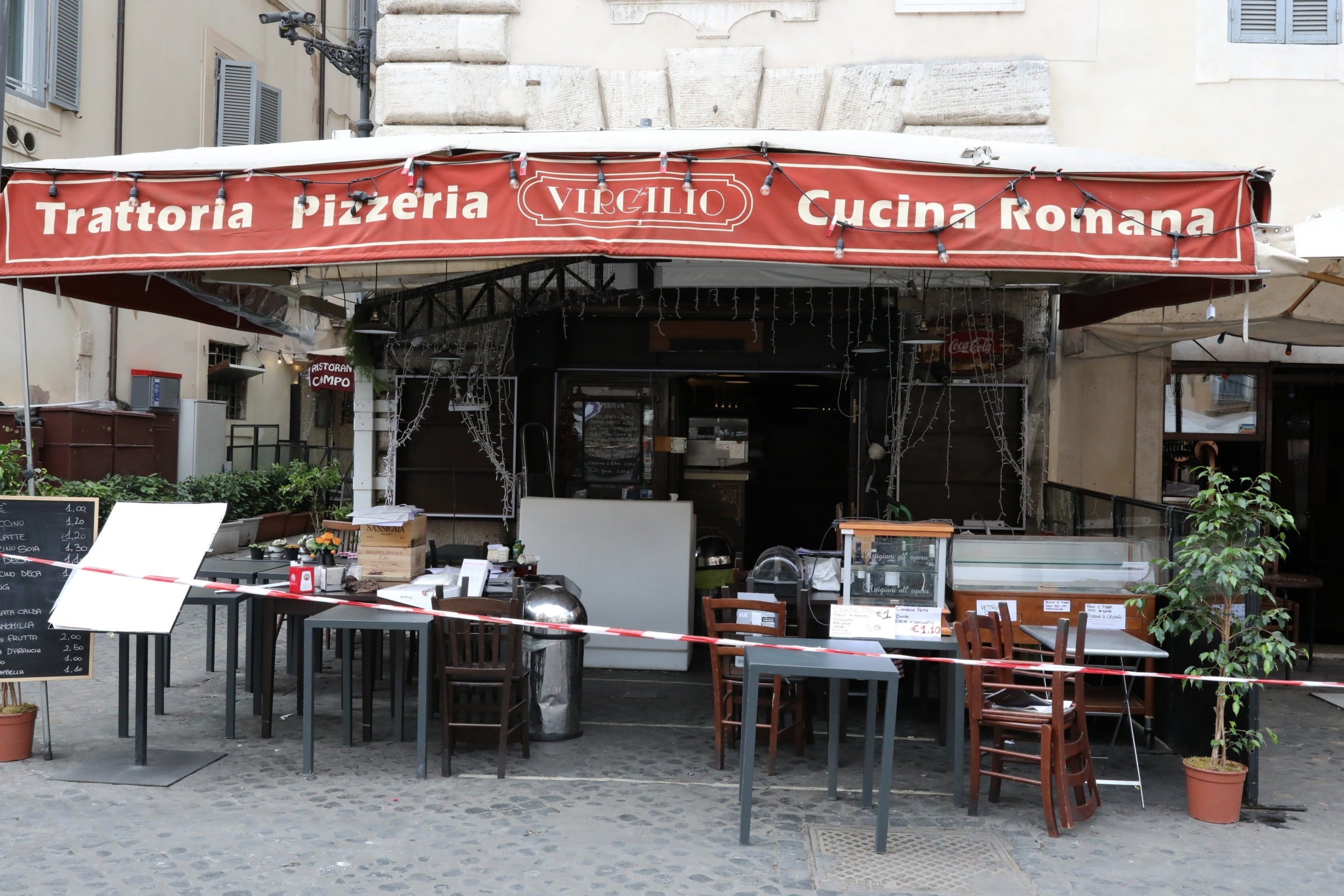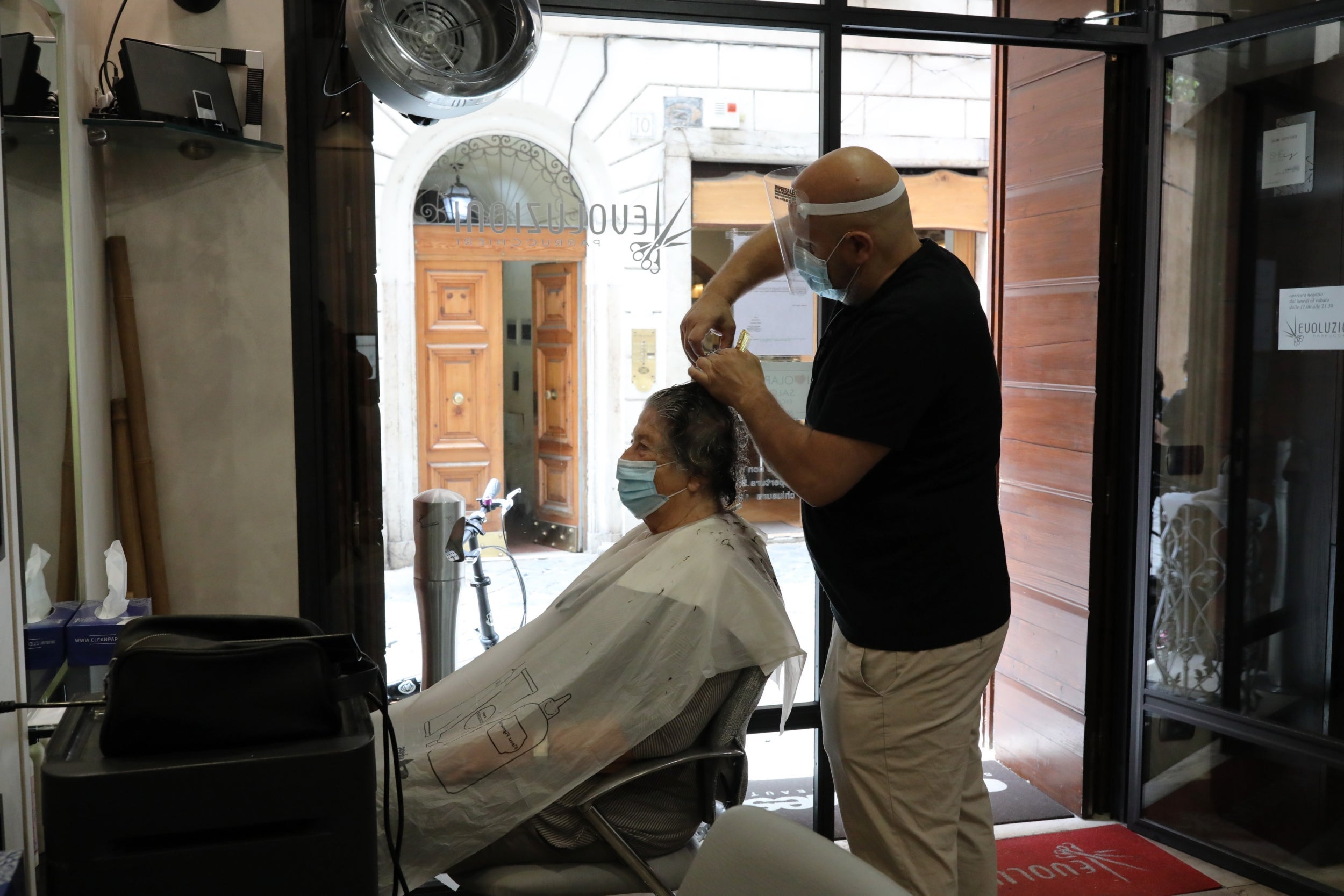‘People are scared’: Italy’s restaurants and shops reopen after 70 days, but customers stay away
For a country devastated by the coronavirus, the reopening of businesses is just a small step towards a return to normal life – and struggling business owners tell Alessio Perrone they ‘don’t expect good times soon’

Your support helps us to tell the story
This election is still a dead heat, according to most polls. In a fight with such wafer-thin margins, we need reporters on the ground talking to the people Trump and Harris are courting. Your support allows us to keep sending journalists to the story.
The Independent is trusted by 27 million Americans from across the entire political spectrum every month. Unlike many other quality news outlets, we choose not to lock you out of our reporting and analysis with paywalls. But quality journalism must still be paid for.
Help us keep bring these critical stories to light. Your support makes all the difference.
Opening the doors of his clothing store for the first time in 70 days, Mr Wu’s fleeting hope quickly gave way to fear as he walked through the cluttered shop floor filled with last season’s collection.
“It’s difficult after more than two months, you know,” he says, rubbing his thumbs on his index and middle fingers to signal that money is lacking.
Mr Wu welcomes this small step towards normality, but he says customers have been very few and that he spent the first day back “mostly unpacking boxes”.
With winter clothes still on display, he fears the whole collection will remain unsold at least until next year.
Like Mr Wu’s business, hundreds of thousands of shops, restaurants and cafes across Italy received customers on Monday for the first time since early March.
Non-essential shops had remained closed until this point, with people only allowed out in cases of necessity or to see family members.
On Saturday, however, the government announced it would suddenly lift Europe‘s longest lockdown. On 25 May, gyms and sports centres will also be able to reopen, and the country expects to lift border restrictions for international travel within the EU on 3 June.
It is a move fraught with risk. Italy has not yet rolled out sizeable contact-tracing operations, distributed millions of inexpensive surgical masks to pharmacies, or started mass antibody tests – as authorities had promised.

At least 300 people with the coronavirus died in Italy over the weekend, and the pandemic is still not under control in some of the country’s northern regions. “We have to be aware that the epidemic is still active, and some estimates suggest 3-4 million people have been infected,” Nino Cartabellotta, a prominent health-care researcher, told Valigia Blu, adding that reopening was increasing the risk of a second wave at the start of the summer.
Italy’s prime minister, Giuseppe Conte, acknowledged that the coronavirus could spread again quickly but said the country had to take a “calculated risk” or head towards economic meltdown. “We are facing this risk and have to accept it,” Conte said. “Or we will never be able to reopen.”
It’s not the same as it used to be. A bar is not like a bus, where you can put signs over a chair
In a letter to the Leggo newspaper, Conte warned that Italy faced the most difficult challenge since the Second World War, and that the next few months would be “hard and complicated”.
This seems the case for many small businesses already. Mr Zecchillo, the owner of the Bar Paradise cafe near Milan’s football stadium, says that things are going “very badly” – even with the reopening. Both Mr Zecchillo and Mr Wu asked that only their last names be used.
More than 300 people tested positive for the coronavirus in Lombardy, where Milan is situated, on Sunday alone, and Mr Zecchillo said his bar had seen one-fourth of its usual customers in the morning. “It’s not the same as it used to be,” he says as he makes two espressos for customers sitting outdoors. “A bar is not like a bus, where you can put signs over a chair.”
Mr Zecchillo says the looming threat of the virus seems to have made his customers more nervous, too. “This morning, two customers were fighting after one had pulled his chair a little bit too close,” he says, shaking his head. “People come to a cafe because they want to relax. They are not relaxing in these conditions.”
Many shops and restaurants are not reopening at all: despite government support and the permit to reopen, they would not be able to turn a profit with social-distancing measures. Across the street from Zecchillo’s Bar Paradise, another cafe is still closed. “We suspend our activity for safety reasons,” a sign dated 3 March says. According to ConfCommercio, an association of businesses, three in 10 bars and restaurants will remain closed.

Nearby, customers seem to huddle outside Stefania Marro’s footwear shop. However, she says most came by to chat, and she only sold four pairs of shoes in the first half of the day.
“There’s a lot of concern, people are scared to go out,” she says. “This is a historic shop that serves the neighbourhood – my father started it in 1960, and I would have liked to keep it,” says Marro, adding that she had to furlough all 12 of her employees.
To make her most loyal customers feel safe, Marro says she sent them an email to tell them that the shop was reopening and allow them to book appointments to collect their shoes. With the contagion still at a high level in Milan, though, many of the older customers replied that their families were barring them from going out.
“We want to be optimists, and although we don’t expect good times soon, we did what we had to do,” she says. “We cleaned, hung signs, prepared, sanitised.” She even puts on a visor, in addition to the face mask.
What’s still missing, she says, are the customers.
Subscribe to Independent Premium to bookmark this article
Want to bookmark your favourite articles and stories to read or reference later? Start your Independent Premium subscription today.
Join our commenting forum
Join thought-provoking conversations, follow other Independent readers and see their replies
Comments